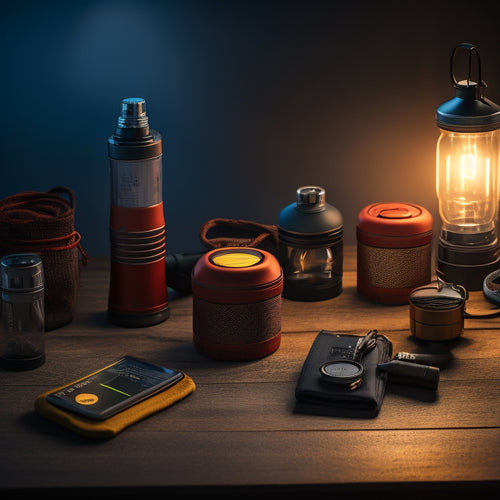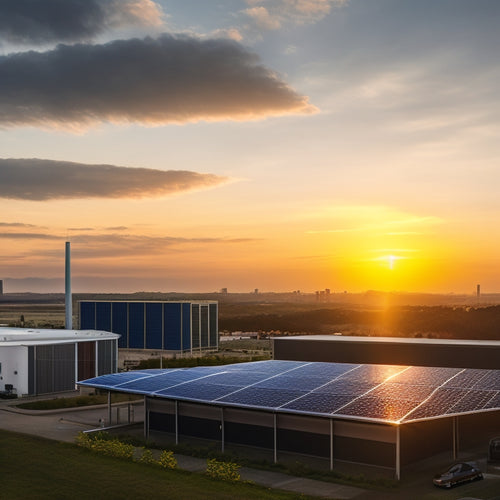
Top Solar Battery Picks for Renewable Energy Systems
Share
When selecting a solar battery for your renewable energy system, you'll want to explore top off-grid battery options like lithium-ion, lead-acid, and saltwater batteries. For deep cycle solar batteries, prioritize high depth of discharge (DOD) and compliance with solar regulations. Seek out high-capacity energy storage systems with long-lasting battery life, advanced battery management, and efficient off-grid energy systems. You'll need to balance performance, durability, and affordability to achieve grid independence. As you delve into the world of solar batteries, you'll uncover more about the best picks for your renewable energy system and how to optimize your setup for maximum efficiency.
Key Takeaways
• Consider high-capacity deep cycle batteries like Rolls Surrette S440 and Trojan Battery 31-XT for reliable off-grid energy systems.
• Look for batteries with high energy density, long cycle life, and low maintenance like Lithium-ion and Saltwater batteries.
• Prioritize advanced battery management systems (BMS) with smart charging, predictive maintenance, and real-time monitoring for efficient operation.
• Choose batteries with long-lasting lifetimes exceeding 10 years, enhanced by innovative materials and regular maintenance.
• Ensure seamless integration with existing solar arrays and hybrid systems for consistent power supply and grid resilience.
Top Off-Grid Battery Options
When selecting the right off-grid battery for your renewable energy system, you'll want to evaluate five top options that balance performance, durability, and affordability. These batteries are essential for achieving grid independence, especially in rural installations where traditional power grids are often unreliable or non-existent.
You'll need a battery that can store excess energy generated by your solar panels or wind turbines during the day, and provide power at night or during periods of low energy production.
Leading off-grid battery options include lithium-ion batteries, lead-acid batteries, and saltwater batteries, each with their unique strengths and weaknesses.
For instance, lithium-ion batteries offer high energy density and long cycle life, making them ideal for small-scale, remote installations. On the other hand, lead-acid batteries are more affordable and well-suited for larger, rural installations. Saltwater batteries, meanwhile, boast an eco-friendly design and low maintenance requirements.
Best Deep Cycle Solar Batteries
You'll need a deep cycle solar battery that can withstand the demands of your renewable energy system, and these top picks offer the reliability and performance you require. When selecting a deep cycle battery, consider the depth of discharge (DOD), as it affects the battery's lifespan. Look for batteries with a high DOD, such as 80% or higher, to ensure peak performance.
Regular Battery Maintenance is vital to extend the lifespan of your deep cycle battery. Monitor the battery's state of charge, voltage, and temperature to prevent overcharging or undercharging. Adhere to Solar Regulations, such as those set by the International Electrotechnical Commission (IEC), to guarantee your system complies with safety standards.
Our top picks for deep cycle solar batteries include the Rolls Surrette S440, the Trojan Battery 31-XT, and the East Penn Deka 8A24. These batteries offer exceptional performance, reliability, and durability, making them ideal for your renewable energy system.
With proper maintenance and adherence to solar regulations, these batteries will provide years of efficient energy storage.
High-Capacity Energy Storage Systems
When it comes to high-capacity energy storage systems, you're likely looking for batteries that can handle heavy loads and provide reliable power.
You need batteries with deep cycle capabilities that can withstand repeated charging and discharging without losing their capacity.
Look for systems that offer long-lasting battery life, high-power output, and dependable performance to guarantee your renewable energy system runs smoothly.
Deep Cycle Capabilities
For high-capacity energy storage systems, deep cycle batteries are designed to provide a steady flow of energy over an extended period, making them an ideal choice for renewable energy systems that require reliable backup power. These batteries are built to withstand repeated charge and discharge cycles, guaranteeing that your renewable energy system remains operational even during periods of low energy production.
When selecting a deep cycle battery, consider the following key factors:
-
Low Maintenance: Look for batteries with minimal maintenance requirements, such as those with sealed or maintenance-free designs.
-
Cycle Testing: Make sure that the battery has undergone rigorous cycle testing to ensure its performance and longevity.
-
Depth of Discharge (DOD): A higher DOD indicates a battery's capability to provide a steady flow of energy over an extended period.
- Round-Trip Efficiency: Opt for batteries with high round-trip efficiency to minimize energy losses during charging and discharging.
Long-Lasting Battery Life
High-capacity energy storage systems demand batteries that can deliver long-lasting performance, and manufacturers have responded by developing batteries with extended lifetimes through innovative materials and design enhancements. As you explore the market for solar batteries, you'll find that many top models boast impressive lifetimes, often exceeding 10 years. This is made possible through advanced materials and clever design tweaks that minimize degradation and optimize energy efficiency.
When it comes to long-lasting battery life, important maintenance plays a vital role. You'll want to make sure you're performing regular checks and maintenance tasks to keep your batteries in top shape. This includes monitoring temperature, state of charge, and depth of discharge, as well as keeping your batteries clean and free from corrosion.
High-Power Output
You'll require batteries that can handle high-power output to support your renewable energy system's peak demand periods, especially during periods of high energy consumption or when the grid is unavailable. This is essential for maintaining Grid Resilience, making sure that your system can withstand sudden spikes in energy demand.
When selecting high-power output batteries, consider the following key factors:
-
Energy Density: Look for batteries with high energy density to maximize your system's power output while minimizing space requirements.
-
Power-to-Energy Ratio: Opt for batteries with a high power-to-energy ratio to guarantee your system can handle sudden surges in energy demand.
-
Cycle Life: Choose batteries with a high cycle life to ensure consistent performance over time, even during periods of high energy consumption.
- Thermal Management: Consider batteries with advanced thermal management systems to prevent overheating and maintain peak performance.
Lithium-Ion Solar Battery Picks
When selecting lithium-ion solar batteries, you'll want to think about models that offer high-capacity energy storage, ensuring you can power your renewable energy system reliably.
Long cycle life expectancy is also essential, as it directly impacts the overall cost-effectiveness of your setup.
High-Capacity Energy Storage
In large-scale renewable energy systems, lithium-ion solar batteries have emerged as a top choice for high-capacity energy storage, offering a reliable and efficient solution to stabilize the grid and guarantee a steady power supply.
As you explore high-capacity energy storage options, you'll want to examine lithium-ion solar batteries that prioritize energy efficiency and grid resiliency. These batteries are crafted to optimize energy storage and release, making sure that your renewable energy system operates at peak performance.
Here are some key benefits of high-capacity lithium-ion solar batteries:
-
Scalability: Lithium-ion solar batteries can be scaled up or down to meet the specific energy storage needs of your renewable energy system.
-
High Energy Density: These batteries offer high energy density, allowing for more efficient energy storage and release.
-
Long-Lasting Performance: Lithium-ion solar batteries are designed to deliver long-lasting performance, even in high-demand applications.
- Grid Resiliency: By stabilizing the grid and guaranteeing a steady power supply, lithium-ion solar batteries help ensure grid resiliency and energy efficiency.
Long Cycle Life Expectancy
When evaluating lithium-ion solar batteries for high-capacity energy storage, it's equally vital to examine those with a long cycle life expectancy, such as the ones that can withstand up to 5,000 charge and discharge cycles, ensuring a reliable and efficient energy storage solution.
You'll want batteries that can maintain their performance over time, even with frequent charging and discharging. A long cycle life expectancy translates to reduced maintenance and replacement costs, making your renewable energy system more cost-effective in the long run.
Moreover, a reliable energy storage system is essential for grid resilience and energy security, as it enables you to store excess energy generated during the day for use during periods of high demand or when the grid is down.
Advanced Battery Management
You'll want to look for lithium-ion solar batteries with advanced battery management systems (BMS) that can monitor and control critical parameters, such as voltage, temperature, and state of charge, to guarantee peak performance, safety, and lifespan. A sophisticated BMS guarantees that your battery operates within a safe and efficient range, preventing damage from overcharging, overheating, or deep discharging.
Here are some key features to look for in an advanced BMS:
-
Smart Charging: A BMS that can optimize charging cycles to minimize wear and tear, reducing the risk of premature aging.
-
Predictive Maintenance: Advanced monitoring capabilities that detect potential issues before they become major problems, allowing for proactive maintenance and minimizing downtime.
-
Real-time Monitoring: A BMS that provides instant insights into battery performance, enabling data-driven decisions and efficient energy management.
- Cell Balancing: A system that ensures individual cells are charged and discharged evenly, maximizing overall battery efficiency and lifespan.
Most Efficient Off-Grid Energy Systems
Modern off-grid energy systems prioritize efficiency, and your most efficient setup will likely combine a high-capacity solar array with a robust battery bank. This synergy enables you to harness and store renewable energy, guaranteeing a reliable power supply even in remote areas. In rural electrification projects, off-grid systems provide a lifeline, connecting communities to the grid and fostering economic growth.
To achieve grid resilience, consider a hybrid system that incorporates solar, wind, or diesel generators. This setup ensures a consistent power supply, even during periods of low solar irradiance or grid outages. By integrating a high-capacity battery bank, you can store excess energy generated during the day for use during the night or during power outages.
This approach not only enhances grid resilience but also reduces reliance on fossil fuels, minimizing your carbon footprint. By designing an efficient off-grid energy system, you can enjoy a reliable, sustainable, and cost-effective power supply, even in the most remote locations.
Solar Panel Battery Backup Systems
Opt for a solar panel battery backup system that seamlessly integrates with your existing solar array to provide a reliable and efficient power supply during grid outages or low-sunlight periods. This setup guarantees you're not left in the dark when the grid goes down, and you can continue to power your essential appliances.
With a solar panel battery backup system, you'll enjoy improved grid resilience and reduced dependence on the grid.
Here are some key benefits to take into account:
-
Uninterrupted Power Supply: Your solar panel battery backup system will continue to power your home even when the grid is down.
-
Reduced Energy Costs: By storing excess energy generated by your solar panels, you can decrease your energy bills and optimize your energy usage.
-
Increased Grid Resilience: With a solar panel battery backup system, you're less reliant on the grid, making you more resilient to power outages.
- Enhanced Energy Independence: You'll have more control over your energy usage and be less affected by grid outages or rate hikes.
Long-Lasting Renewable Energy Solutions
Your renewable energy system deserves a battery that can keep pace with your growing energy demands, providing years of reliable performance and minimizing the need for frequent replacements.
As you invest in a sustainable future, it's crucial to contemplate the long-term viability of your energy storage solution. A long-lasting battery guarantees that your green infrastructure remains efficient, reducing the environmental impact of frequent replacements and waste generation.
When selecting a solar battery, look for products with a proven track record of reliability and durability. A battery with a long lifespan can help you achieve a lower levelized cost of energy, making your renewable energy system more cost-effective in the long run.
Additionally, a reliable battery ensures that your energy storage system can adapt to changing energy demands, providing a stable and efficient power supply. By choosing a high-quality, long-lasting battery, you can create a sustainable future that's built to last, reducing your reliance on fossil fuels and supporting a cleaner, greener environment.
Frequently Asked Questions
Can a Single Solar Battery Power My Entire Home?
'Imagine powering your entire home with a single solar battery, like the Tesla Powerwall, which can store 13.5 kWh of energy. Depending on your energy efficiency and home automation setup, it's possible, but you'll need to take into account your energy usage and system design.'
How Do I Maintain and Clean My Solar Battery?
You'll want to conduct regular battery inspections to guarantee peak performance, checking for signs of wear and corrosion. Additionally, verify your solar battery's water resistance rating to make sure it can withstand environmental exposure.
Do Solar Batteries Work During Power Outages?
During power outages, you can rely on solar batteries to provide backup power, ensuring grid resilience and emergency preparedness, as long as they're properly installed and configured to prioritize local loads over grid-tied operations.
Can I Use a Solar Battery With an Existing System?
'Like a master builder adding a new wing to a historic mansion, you can integrate a solar battery into your existing system, but first, guarantee a seamless System Upgrade by checking Energy Compatibility to avoid any structural flaws.'
Are Solar Batteries Recyclable at the End of Their Life?
You're likely wondering if solar batteries are recyclable at the end of their life, reducing environmental impact. Fortunately, many manufacturers offer recycling incentives, making it easier for you to responsibly dispose of your battery when it reaches its end-of-life.
Related Posts
-

Best Solar Powered Flashlights for Emergency Situations
When you're choosing the best solar-powered flashlights for emergency situations, focus on their brightness, battery ...
-

High-Efficiency Solar Battery Chargers for Remote Areas
High-efficiency solar battery chargers are essential for your off-grid energy needs in remote areas. They maximize en...
-

Advantages of Commercial Solar Battery On-Site Storage
By investing in a commercial solar battery on-site storage system, you can greatly reduce your energy grid dependence...


